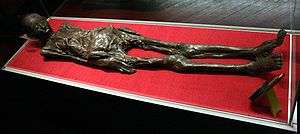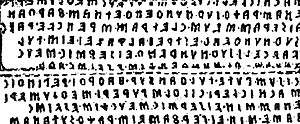Liber Linteus
The Liber Linteus Zagrabiensis (Latin for "Linen Book of Zagreb", also rarely known as Liber Agramensis, "Book of Agram") is the longest Etruscan text and the only extant linen book, dated to the 3rd century BCE. It remains mostly untranslated because of the lack of knowledge about the Etruscan language, though the few words which can be understood indicate that the text is most likely a ritual calendar.
The fabric of the book was preserved when it was used for mummy wrappings in Ptolemaic Egypt. The mummy was bought in Alexandria in 1848 and since 1867 both the mummy and the manuscript have been kept in Zagreb, Croatia, now in a refrigerated room at the Archaeological Museum.
History of discovery

In 1848, Mihajlo Barić (1791–1859), a low ranking Croatian official in the Hungarian Royal Chancellery, resigned his post and embarked upon a tour of several countries, including Egypt. While in Alexandria, he purchased a sarcophagus containing a female mummy, as a souvenir of his travels. Barić displayed the mummy at his home in Vienna, standing it upright in the corner of his sitting room. At some point he removed the linen wrappings and put them on display in a separate glass case, though it seems he had never noticed the inscriptions or their importance.
The mummy remained on display at his home until his death in 1859, when it passed into possession of his brother Ilija, a priest in Slavonia. As he took no interest in the mummy, he donated it in 1867 to the State Institute of Croatia, Slavonia, and Dalmatia in Zagreb (the present-day Archaeological Museum in Zagreb). Their catalogue described it as follows:
- Mummy of a young woman (with wrappings removed) standing in a glass case and held upright by an iron rod. Another glass case contains the mummy's bandages which are completely covered with writing in an unknown and hitherto undeciphered language, representing an outstanding treasure of the National Museum.
The mummy and its wrappings were examined the same year by the German Egyptologist Heinrich Brugsch, who noticed the text, but believed them to be Egyptian hieroglyphs. He did not undertake any further research on the text, until 1877, when a chance conversation with Richard Burton about runes made him realise that the writing was not Egyptian. They realised the text was potentially important, but wrongly concluded that it was a transliteration of the Egyptian Book of the Dead in the Arabic script.
In 1891, the wrappings were transported to Vienna, where they were thoroughly examined by Jacob Krall, an expert on the Coptic language, who expected the writing to be either Coptic, Libyan or Carian. Krall was the first to identify the language as Etruscan and reassemble the strips. It was his work that established that the linen wrappings constituted a manuscript written in Etruscan.
At first, the provenance and identity of the mummy were unknown, due to the irregular nature of its excavation and sale. This led to speculation that the mummy may have had some connection to either the Liber Linteus or the Etruscans. But a papyrus buried with her proves that she was Egyptian and gives her identity as Nesi-hensu, the wife of Paher-hensu, a tailor from Thebes.[1]
Text
.jpg)

Date and origin
On paleographic grounds, the manuscript is dated to approximately 250 BC. Certain local gods mentioned within the text allow the Liber Linteus's place of production to be narrowed to a small area in the southeast of Tuscany near Lake Trasimeno, where four major Etruscan cities were located: modern day Arezzo, Perugia, Chiusi and Cortona.
Structure
The book is laid out in twelve columns from right to left, each one representing a "page". Much of the first three columns are missing, and it is not known where the book begins. Closer to the end of the book the text is almost complete (there is a strip missing that runs the entire length of the book). By the end of the last page the cloth is blank and the selvage is intact, showing the definite end of the book.
There are 230 lines of text, with 1200 legible words. Black ink has been used for the main text, and red ink for lines and diacritics.
In use it would have been folded so that one page sat atop another like a codex, rather than being wound along like a scroll. Julius Caesar is said to have folded scrolls in similar accordion fashion while on campaigns.
Content
Though the Etruscan language is not fully understood, certain words can be picked out of the text to give us an indication of the subject matter. Both dates and the names of gods are found throughout the text, giving the impression that the book is a religious calendar. Such calendars are known from the Roman world, giving not only the dates of ceremonies and processions, but also the rituals and liturgies involved, the lost Etrusca disciplina referred to by several Roman antiquarians.
The theory that this is a religious text is strengthened by recurring words and phrases that are surmised to have liturgical or dedicatory meanings. Some notable formulae on the Liber Linteus include a hymn-like repetition of ceia hia in column 7, and variations on the phrase śacnicstreś cilθś śpureśtreśc enaś , which is translated by van der Meer as "by the sacred fraternity/priesthood of cilθ, and by the civitas of enaś".[2]
Notes
- "The Egyptian Collection: The Zagreb Mummy". Archaeological Museum in Zagreb. Archived from the original on 20 September 2016. Retrieved 7 February 2012.
- The phrase is restored at line 2.1‑2 and repeated at 2.3‑4+. Van der Meer's translation is " not significantly different from what can be found in other handbooks." See Beckwith, Miles (2008) "Review of L.B. van der Meer, "Liber Linteus Zagrabiensis", Rasenna: Journal of the Center for Etruscan Studies, Vol. 1, Issue 1, Article 4.
Bibliography
- Krall, Jakob (1892-01-07). Tempsky, F. (ed.). Die etruskischen Mumienbinden des Agramer National-museums [The Etruscan mummy wrappings from the Zagreb national museum] (in German). Wien.
- K. Olzscha "Aufbau und Gliederung in den Parallelstellen der Agramer Mumienbinden" I and II in Studi Etruschi VIII 1934 pp. 247 ff. and IX 1935 pp. 191 ff.
- K. Olzscha "Interpretation der Agramer Mumienbinden" in Klio Beiheft 40 Leipzig 1939.
- Olzscha, K. (1959). "Die Kalendardaten der Agramer Mumienbinden" [The calendar data from the Zagreb mummy wrappings]. Aegyptus (in German). 39 (3/4): 340. ISSN 0001-9046. JSTOR 41215687.
- A. J. Pfiffig "Studien zu den Agramer Mumienbinden" in Denkschriften der Österreiches Akademie der Wissenshaften, philosophische-historische Klasse Bd. 81 Österreichische Akademie der Wissenschaften, Wien 1963.
- Wylin, Koen (2000). Il verbo etrusco : ricerca morfosintattica delle forme usate in funzione verbale (in Italian). Roma: L'Erma di Bretschneider. ISBN 978-88-8265-084-1. OCLC 44098559.
- L. B. van der Meer Liber linteus zagrabiensis. The Linen Book of Zagreb. A Comment on the Longest Etruscan Text. Louvain/Dudley, MA 2007 ISBN 978-90-429-2024-8.
- Woudhuizen, F. C. (2008). "Ritual prescriptions in the Etruscan Liber linteus". Res Antiquae. Bruxelles: Safran. 5: 281-296. ISSN 1781-1317.
- V. Belfiore Il liber linteus di Zagabria: testualità e contenuto. Biblioteca di Studi Etruschi 50 Pisa-Roma 2010. ISBN 978-88-6227-194-3.
External links

